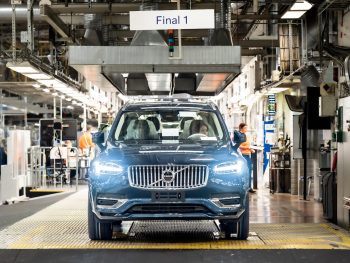Volvo says goodbye diesel, hello electric
Volvo’s last diesel car has rolled off production lines as the carmaker pushes ahead with plans to go electric-only.
The final diesel – an XC90 SUV – was produced at the plant in Torslanda, Sweden on 26 March and is now heading off to the World of Volvo museum in Gothenburg.
It’s a huge milestone in Volvo’s 97-year history – and fulfils a promise made six months ago at the 2023 Climate Week NYC. It also marks a big step in the carmaker’s ambitions of going fully electric, as well as achieving net zero greenhouse gas emissions by 2040.
Volvo had already exited the development of new combustion engines. It initially hived off its remaining combustion engine assets into the Aurobay joint venture in 2021 and then sold its stake in the business in November 2022.
For many years, Volvo was synonymous with diesel-powered models, known for their reliability and efficiency – and it says the success of its diesel cars played a significant role in its evolution into a premium brand.
Its diesel history stretches back 45 years to 1979 with the 244 GL D6 – which was the world’s passenger car diesel with six cylinders.
But a spokesperson said: “In recent years, the electric revolution has evolved quicker than most of us could have imagined – and it’s largely propelled by tightening regulations around tailpipe emissions, as well as customer demand in response to the climate crisis and a desire for cleaner urban air.
“Only five years ago, the diesel engine was our bread and butter in Europe, just like it was for most other carmakers. The majority of the cars we sold in Europe in 2019 ran on diesel, while electric models were just starting to gain traction.”
Fast-forward to today and most Volvo sales on the continent are electrified cars. In 2023, the Swedish automaker increased sales of fully electric cars by 70%, and its global electric market share by 34%.
“The figures speak for themselves, underscoring that the all-electric direction we’re now heading towards is the right one to take, and we do so with our flag held high,” added Volvo.
However, while the company is pushing ahead with plans to go fully electric, it will still offer both plug-in hybrid and mild-hybrid models, which will “act as a perfect bridge” towards that future.
The brand’s fully electric line-up includes the XC40 Recharge and C40 Recharge electric crossovers, now known as the EX40 and EC40, plus the recently launched EX30 electric crossover and the EX90 SUV due this year.
Volvo also recently announced that it’s investing in UK-based battery management software start-up Breathe in return for getting early access to the company’s latest-generation battery management software.
The patented, algorithm-enabled charging software will be used on Volvo’s new-generation fully electric cars, cutting the time taken to charge from 10 to 80% by as much as 30%, while maintaining the same energy density and range.








